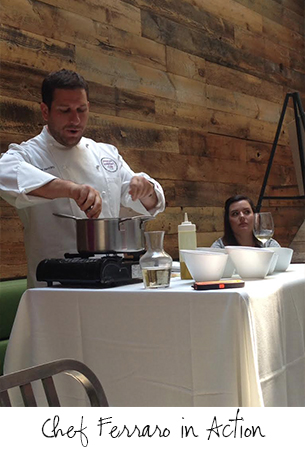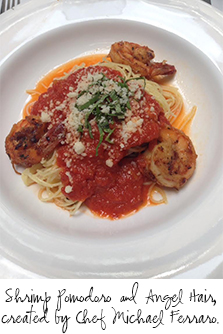When Lillian Ferraro was diagnosed with pancreatic cancer, her loving family of three children and five grandchildren sprung into action to get her the best medical treatment possible. Besides the surgery and continual therapies over nine years, Mamma Ferraro had therapy of another kind: Nourishing and tasteful meals, specially created for her by her chef son, Michael, that “spoke to” the many horrible symptoms of her disease, including fat intolerance, indigestion, nausea and vomiting, severe gas and bloating, and periodic diarrhea. Happily, this allowed her to continue to enjoy meals with her wonderful family. “We wanted to serve food we would all love to eat so my mother didn’t feel left out,” Michael said.
 Now, Michael is one of a panel of experts involved with a new nutritional program, called Cooking. Comfort. Care. Nourishment for the Pancreatic Cancer Fight, launched by Celgene Corporation (makers of Abraxane, a drug to treat aggressive pancreatic cancer). Other participating experts include Jessica Iannotta, oncology dietitian and COO of Meals to Heal, and Julie Fleshman, President and CEO of the Pancreatic Cancer Action Network (PanCan).
Now, Michael is one of a panel of experts involved with a new nutritional program, called Cooking. Comfort. Care. Nourishment for the Pancreatic Cancer Fight, launched by Celgene Corporation (makers of Abraxane, a drug to treat aggressive pancreatic cancer). Other participating experts include Jessica Iannotta, oncology dietitian and COO of Meals to Heal, and Julie Fleshman, President and CEO of the Pancreatic Cancer Action Network (PanCan).
“We believe that proper nutrition is an essential element in a comprehensive cancer care management program,” said Iannotta, whose three-year-old organization,  Meals to Heal, consults and counsels patients with all types of cancer, delivers meals and provides information blogs on its website. “Our team of oncology nutrition professionals recognizes that keeping a patient’s weight stable also successfully helps get through her treatments. Patients like knowing they can control what they eat, even if they can’t control anything else about their diseases,” Iannotta explained. “We want to give patients access to the proper information about their diseases and to help them find the right resources. They also should make certain that a registered dietician is part of their caregiving team.”
Meals to Heal, consults and counsels patients with all types of cancer, delivers meals and provides information blogs on its website. “Our team of oncology nutrition professionals recognizes that keeping a patient’s weight stable also successfully helps get through her treatments. Patients like knowing they can control what they eat, even if they can’t control anything else about their diseases,” Iannotta explained. “We want to give patients access to the proper information about their diseases and to help them find the right resources. They also should make certain that a registered dietician is part of their caregiving team.”
“The health care system is way behind when it comes to the nutrition part of cancer treatment,” Chef Ferraro said. “My mother wouldn’t eat the hospital food. It doesn’t look fresh and they just want you to get calories!”.
 “My father was diagnosed with pancreatic cancer, at 52, and died four months later from the disease,” said Julie Fleshman of PanCan. “At the end, he was eating from a tube and couldn’t have the quality of life that could benefit him now. Pancan.org offers great recipes that are quick, easy to prepare, and not labor intensive. Featuring hearty, nutritional ingredients, they’re easy to digest and tolerate. We help patients manage their symptoms and plan to introduce a mobile app in the near future,” Fleshman added.
“My father was diagnosed with pancreatic cancer, at 52, and died four months later from the disease,” said Julie Fleshman of PanCan. “At the end, he was eating from a tube and couldn’t have the quality of life that could benefit him now. Pancan.org offers great recipes that are quick, easy to prepare, and not labor intensive. Featuring hearty, nutritional ingredients, they’re easy to digest and tolerate. We help patients manage their symptoms and plan to introduce a mobile app in the near future,” Fleshman added.
“Those stats and my personal experience with my father drive my passion to provide comprehensive services to patients and their families, so they’re empowered to make decisions, and to fund research and drive advocacy to change patient outcomes,” Fleshman said.

Many people don’t realize that PC is currently the 4th leading cause of cancer deaths in the United States (behind lung, colon and breast cancer), and is expected to become the second leading cause of cancer deaths by 2020, only 5 years away!
“The incidence for all cancers is going up, but the death rates for most cancers are doing down, due to better treatment and early detection,” Fleshman said. However, the incidence for pancreatic cancer is rising, as the population ages, and is expected to reach 88,000 cases by 2030. The death rates also are rising, because there is no early detection or effective long-term treatment.
Deaths from pancreatic cancer are likely to surpass those from breast cancer by 2016.

